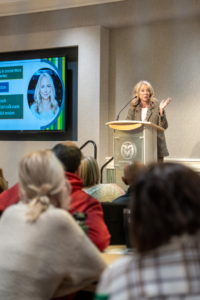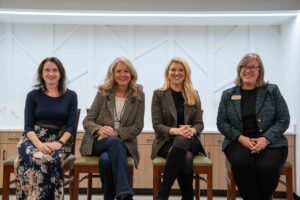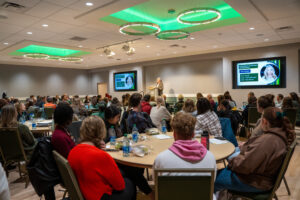At first glance, you might not guess New Belgium Brewing co-founder Kim Jordan’s background is in social work. However, it was that groundwork, laid at Colorado State Univeristy’s School of Social Work, that set Jordan up to build and run a company that now acts as a benchmark for redefining success beyond shareholder value.
Jordan recently returned to CSU’s campus to share how her social work classes and mentors set her up to use business as a force for good. Jordan’s talk is this year’s installment of the Leadership in Social Work Speaker Series, hosted by the Center for Lifelong Learning, Outreach, and Education.
Watch a 2 minute highlight of Jordan’s talk below.
Social work as business training
“Social work is terrific training to be a progressive business leader,” Jordan said in her Oct. 27 lecture. New Belgium Brewing’s business practices bear this out.
 “Social work is a generalist perspective here at CSU. I would also offer that it has a systems theory bent,” Jordan said. “How do we organize and train ourselves in a way that supports doing our very best work?”
“Social work is a generalist perspective here at CSU. I would also offer that it has a systems theory bent,” Jordan said. “How do we organize and train ourselves in a way that supports doing our very best work?”
Jordan said that combination benefited her greatly as she learned to be a leader. “That construct is perfect for a CEO, which demands a wide set of capabilities more than a specific skillset.”
Employee ownership, high-involvement culture, and environmentally and community friendly business practices were all instituted at New Belgium to create a company that not only served Jordan and her business partner and former husband Jeff Lebesch, but their employees, community, and our planet.
Environmental investments at New Belgium included “relentless” energy conservation projects, millions of dollars spent on systems to capture methane waste and recycle it as an energy source, and publishing data on the carbon footprint of beer.
“We reviewed financials every month with our co-workers, we developed strategy, and had unusually open conversations about what we were doing and where we were going as a company,” Jordan said.
Employee ownership
At the end of 2012, New Belgium was 100% employee owned, inclusive of all employees, not just those in leadership roles.
“We did that because we believed that if New Belgium is successful, that would be because all of us worked toward that success, and all of us had earned the equity benefit that comes with that,” she said.
“We talked with expert consultants who said companies give equity to key management. I wanted to be sure everyone was recognized and rewarded.” Sometimes, you have to ignore the experts, Jordan noted.
By 2019, New Belgium was at a crossroads. Competition in craft brewing was fierce, and there was growing interest among employee owners in finding a buyer for the company.
After finding a business partner to acquire the company, over the life of the employee ownership program, New Belgium employees collectively made over $250 million, nearly double any other stakeholder, including her family, according to Jordan.

Business as a force for good
“At New Belgium, we changed people’s lives. I know that because I’ve had many heartfelt conversations with my coworkers. We built equity together and we reaped benefits together,” Jordan said.
Jordan shares this story of New Belgium to illustrate that business can be a force for good if business leaders choose to follow New Belgium’s lead.
“In our country these days, our commitment to ethics, decency, and the wellbeing of our communities feels shaky, and the practice of democracy as a fundamental founding principle of our nation feels imperiled as well,” she said. “I share that story because we need new maps, we need people asking, ‘who do we want to be and who do we need to be?’”
Addressing the challenges of today and tomorrow
Jordan cites declining life expectancy, increases in deaths of despair, increasing wealth inequality, inability to access capital, and the ominous reports from the UN’s Intergovernmental Panel on Climate Change as the things that concern her which social workers and others will need to help address.
 “The track record of business writ large doesn’t bode well for its willingness to be accountable and engaged in this work,” she said. “We’ll need leaders from all sectors to apply their very best committed hearts and minds. We’ll need the legacy companies and scrappy startups to truly believe that they have an important role to play in devising new and better models for running businesses that benefit the world.”
“The track record of business writ large doesn’t bode well for its willingness to be accountable and engaged in this work,” she said. “We’ll need leaders from all sectors to apply their very best committed hearts and minds. We’ll need the legacy companies and scrappy startups to truly believe that they have an important role to play in devising new and better models for running businesses that benefit the world.”
Jordan also acknowledges that this weight doesn’t rest solely on the shoulders of business.
“There are lots of subject matter experts and contributors who are doing and will continue to do incredible work, and it is not the job of enterprise to solve all the world’s problems. These problems are big, multi-factored, and complicated,” she said.
“But unless business gets involved in a big way to work at stewarding our planet and its people, there is no way that improvement in global metrics for planetary health will proceed at the pace we’ll need.”
Advice to social workers
“We will need people like you to bring your values, your energy, and your social work expertise to the shop floor and the boardroom,” she said.
Jordan concluded her talk by expressing optimism about the future. “I have a lot of faith in you. I know the strength of your education as social workers, or in other areas, will make a difference in this world,” she said.
Jordan’s full 30-minute lecture can be watched here on the College of Health and Human Sciences YouTube channel.
The School of Social Work is part of CSU’s College of Health and Human Sciences.